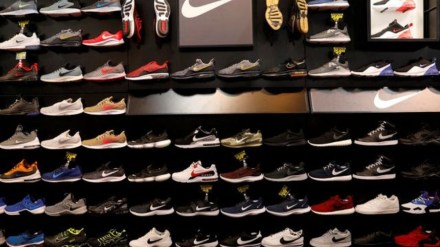US President Donald Trump’s Liberation Day tariffs sent shockwaves down the retail scene, with Nike stock crash emerging as a significant aftermath. With the US imposing a 46% reciprocal tariff rate on Vietnamese goods on Wednesday, the Republican leader’s historic move has severely impacted Nike Inc’s position in the market. Vietnam makes about half of all Nike’s footwear in addition to producing 39% of Adidas shoes, according to regulatory filings cited by Bloomberg.
In the final days leading up to the Trump tariff plan announcement, Reuters predicted beforehand how the president’s big decision could blow up in sportswear brands’ faces as he seeks to encourage domestic production and push US goods’ sales. With Vietnam‘s $123.5 billion trade surplus with the United States, it inevitably became a prime target, further slashing out hopes for several sportwear brands majorly relying on it for production.
How much Nike relies on its largest supplier Vietnam
According to Nike’s annual report, 50% of its footwear and 28% of its apparel were produced in Vietnam in the 2024 financial year. Meanwhile, its top rival Adidas was relatively less reliant on the Asian country with 39% of its footwear and 18% of its apparel coming from there. Vietnam’s low labour costs, skilled workforce, transportation infrastructure and lesser chances of involvement in geopolitical clashes proved it to be a viable manufacturer.
On early April 3 morning (GMT), Bloomberg reported that Nike shares tumbled 6.4% in extended trading at 5:06 pm New York time. While Trump billed the imposition of his tariff plan as “economic independence,” National Retail Federation Executive for American businesses and consumers said on Wednesday, “More tariffs equal more anxiety and uncertainty for American businesses and consumers. Tariffs are a tax paid by the U.S. importer that will be passed along to the end consumer.”
Nike stock right now – the company has >450,000 employees across 130 factories in Vietnam (46% tariff rate) pic.twitter.com/9irIE3j5cW
— Mike Bird (@Birdyword) April 2, 2025
Shares of Shenzhou International Group Holdings Ltd, an Asian clothing manufacturer which is closely associated with brands like Nike for US, also fell as much as 18% in Hong Kong on Thursday. It marked the company’s biggest fall in over three years. In addition to Vietnam being hit with tariffs, other Asian manufacturing hubs including China (34%) and Cambodia (49%) suffered equally.
Stock crash hits Nike at an already critical hour
Nike couldn’t have been hit with these falling number at a worse time. The company recently lost market shares to brands like On and Hoka — emerging rivals viewed as more innovative. On top of that, Chief Financial Officer Matt Friend pointed out during a quarterly earnings call last month that the sportswear company’s revenue was expected to continue plummeting next quarter.
Nike stock slipped 20% in March, according to S&P Global Market Intelligence data. Its stock chart for the month further revealed that while it continued to fall over the month’s entirety, the descent especially sped up after the earnings report.
US-Vietnam trade war at focus
Footwear and apparel industries’ Vietnam connection especially blossomed during Trump’s first term as the trade war with China expanded in the background and brands reduced their exchanges with China. However, the possibility of Vietnam being dragged into Trump’s trade wars erupted in 2019 as the MAGA politician accused the country of taking advantage of the US “even worse than China.”
Vietnam Prime Minister Pham Minh Chinh even admitted to being open to “golf all day long” with Donald Trump at Mar-a-Lago if it would help ease trade disagreements. Beyond its ‘bamboo diplomacy’ approach, the Asian nation actually cut taxes on US imports and approved Starlink services before Trump’s reciprocal tariff announcements, with changes going into effect on March 31. However, the US president has notably looked the other way, compelling the Vietnamese PM to hold an urgent cabinet meeting early on Thursday, just hours after the tariff plan reveal.
“It’s a shock for the global economy, and for the Vietnamese economy,” said economist Vo Tri Thanh, former deputy director of the Vietnam Institute for Economic Management. “It will negatively impact Vietnam’s economy.”
